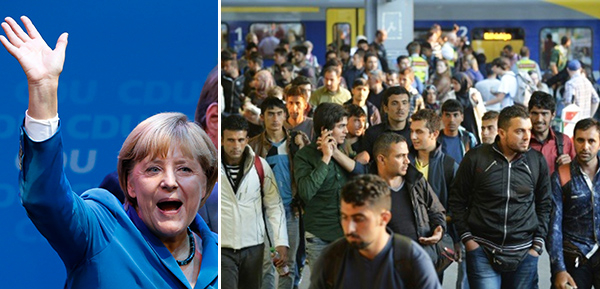How Merkel and Middle Eastern Migration Ensured Britain’s EU Exit
Michel Gurfinkiel/PJ Media/June30/16
Originally published under the title “The Road to Brexit: How Merkel Thwarted Cameron’s Smart Gamble.”
Polls show mass migration was the number one concern of voters in the Brexit referendum.
There were many signposts on the road to Brexit. As early as 2001, the Swiss rejected access to the EU by an overwhelming 72.5%. Four years later, in 2005, both the French and the Dutch rejected a European constitutional treaty project in separate referendums. Polls indicated that similar referendums would have turned the same way in other places.
In recent years, anti-EU defiance increased. Radical anti-EU parties and more moderate Eurosceptic parties won higher and higher returns in most countries, either in national or European ballots. In some countries — Hungary, Poland, Greece — they simply won the election and took over the cabinet. In others — Austria — they almost won.
Brexit is thus not so much a revolution in European affairs as the culmination of a long and steady process.
United Europe had been popular among Europeans, and every European nation was willing to join it — as long as it delivered prosperity, democracy, stability. Global security.
This was true of the six founding nations in the 1950s and 1960s, of Britain, Ireland, Scandinavia and the former Mediterranean dictatorships in the 1970s, and of the former Communist countries of Eastern Europe in the 1990s.
Things changed by the mid-1990s, however, when what had been known hitherto as the European Community was changed into the much tighter European Union. It soon became apparent, whatever the political class would say, that the more centralized the Union became, the less it could actually deliver.
Instead of the ever-increasing prosperity they had taken for granted for a half-century, many Europeans had to face zero growth, bankruptcy, and long-term austerity programs. Instead of more democracy — free expression, the rule of elected and responsible governments — they were getting more political correctness and more bureaucracy.
Instead of more global security, a new pervading sense of powerlessness in front of Russian imperialism and jihadist terror. Instead of more stability, more social disruption — especially in such essential areas as family and national identity.
The EU leadership was aware that things had gone sour and that disaffection was accumulating, but it was not mentally equipped to draw the proper consequences and find solutions.
David Cameron, the conservative Eurosceptic PM of Britain, was an exception in this regard: he had a plan, and a rather brilliant one at that. He was convinced he could have it both ways by organizing a British referendum on Europe — thus allowing the anti-EU tide to rise very high – but to win it, even by a thin edge. He would then have appeared as the savior of Europe, and be in a position to ask for a global reshaping and loosening of the European treaties.
Maybe such a calculation was sound enough in 2013, when Cameron promised to hold a referendum on the British EU membership. There was, however, a dramatic acceleration in the European and British anti-EU public opinion over the past three years. So much so that while Cameron may have been banking on 52% to 48% returns against Brexit, he got just the opposite.
German Chancellor Angela Merkel brought some 800,000 migrants almost overnight into her own 80-million-person country.
Several developments contributed to the pro-Brexit shift. The EU political leadership’s failure to address the global Middle Eastern and North African issues — from the rise of ISIS to the return of Russia, and from the involvement of European Muslims in jihadist massacres in Europe to the migrant crisis — and German Chancellor Angela Merkel’s role in those issues were probably decisive.
Above all, Merkel’s sudden and unilateral embrace one year ago of the Middle Eastern and North African migrants and refugees changed everything. She called for the immediate admission of hundreds of thousands, even millions, to the EU on a proportional per country basis. Indeed, she brought some 800,000 migrants almost overnight into her own 80-million-person country. This move brought a wide range of intractable difficulties, including with sexual ethics and women’s rights issues.
Most other European countries acquiesced to Merkel’s call — but in fact downsized their own admission quotas to much smaller numbers. Hungary, Slovenia, and Poland flatly rejected Merkel’s guidelines.
Many Brits concluded that Eurofederalism led to reckless decisions concerning mass immigration.
Merkel’s then made a no-less-sudden and unilateral rapprochement with Turkey once it was clear that more migrants were planning to settle in the EU. She traded a promise by Ankara to tighten its borders with European countries against a promise to resume decades-old talks for Turkey’s access to the Union. In the meantime, she proposed letting all Turkish citizens into the EU as visitors — even without a visa. There are exactly as many Turks today as Germans: 80 million.
The British — who in spite of an outwardly tolerant view of multiculturalism, have more restrictive immigration laws than most other EU nations, and who never endorsed the Schengen accords about free movement in the EU — were deeply puzzled. Many of those who had wavered until then between Euroscepticism and Eurofederalism concluded that Eurofederalism was leading to reckless, ill-conceived, and unstoppable decisions in such essential fields as mass immigration.
The mess had to be checked, or at least Britain should be kept out of it. Brexit might have looked in the past a bit quixotic, and the European option might have been seen as safer. Thanks to Merkel, the proposition was now reversed.
*Michel Gurfinkiel, a Shillman-Ginsburg Fellow at the Middle East Forum, is the founder and president of the Jean-Jacques Rousseau Institute, a conservative think tank in France.























